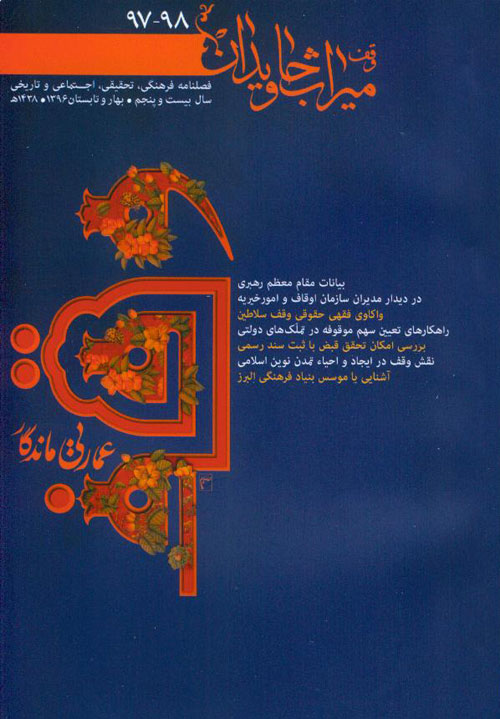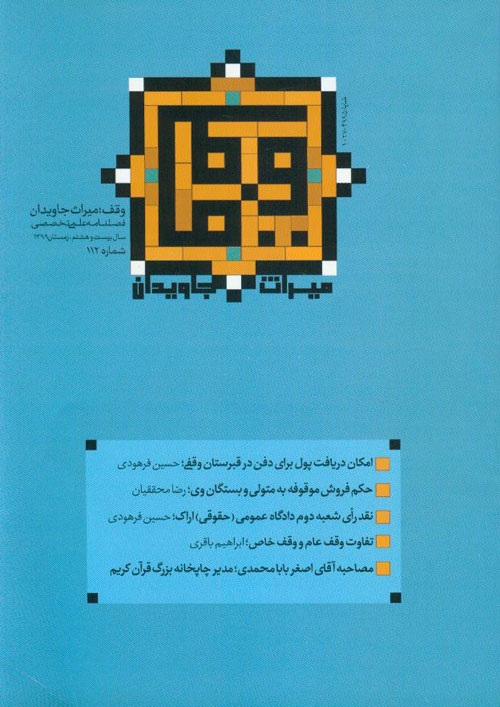فهرست مطالب

فصلنامه وقف میراث جاویدان
پیاپی 97-98 (بهار و تابستان 1396)
- 210 صفحه،
- تاریخ انتشار: 1396/09/11
- تعداد عناوین: 13
- نگاه نو
- فقه و حقوق
-
صفحه 27
-
صفحه 35
وقف های سلاطین و منسوبان آنان در مواردی که علم قطعی یا اماره شرعی وجود دارد که از اموال شخصی آنان یا از اموال عمومی و دولتی بوده که شرعا مجاز به وقف آن بوده اند، صحیح و نافذ است. این اوقاف در پاره ای موارد نیز با استناد به اجازه ولی فقیه تنفیذ می گردد. در مواردی که علم قطعی یا اماره شرعی وجود دارد که اموال شخصی دیگران یا اموال عمومی و دولتی را وقف نموده اند، وقف فضولی بوده و نفوذ آن به اجازه بعدی مالک یا ولی فقیه وابسته است. در موارد تردید نیز با استناد به دلایلی مانند اصل صحت و قاعده ید صحیح تلقی شده و نافذ به شمار م یآید. بر این اساس مصادره موقوفات مزبور، در فروضی که نافذ محسوب می شود، فاقد مشروعیت و وجاهت است. این موقوفات با گذشت زمان و خراب شدن از وقف بودن خارج نمی گردد
کلیدواژگان: وقف سلاطین، اموال شخصی، اموال عمومی، اموال دولتی، مصادره اموالوقفی -
صفحه 63
تولیت موقوفه ب همعنای تصدی موقوفه ب همنظور اداره و رساندن منافع آن به موقو فعلیهم است، از ای نرو متولی موقوفه کسی است که از سوی مالک یا بر اساس مقررات قانونی این سمت را عهده دار گردیده و در جهت تعیی نشده، به اداره امور موقوفه م یپردازد. شیوه عملکرد و اقدامات متولی باید بر اساس نظر واقف و یا مقررات قانونی باشد. واقف م یتواند تولیت وقف را برای خود یا دیگری ب هصورت موقت یا همیشگی قرار دهد. چنانچه واقف نحوه اداره موقوفه را تعیین ننموده باشد براساس اراده موقوف علیهم و یا وفق مقررات قانونی اداره م یشود. تولیت موقوفه از لحاظ زمان و میزان اختیار به محدود و نامحدود و نیز از لحاظ تعدد متولی به استقلالی، اجتماعی یا انضمامی قابل تفکیک است. در تولیت به شیوه استقلالی، متولیان امر موقوفه هر یک به طور مستقل به تولیت امور موقوفه مبادرت می ورزند، درحالی که در تولیت به شیوه اجتماعی یا انضمامی تصمیم هر یک به تصمیم سایرین پیوند م یخورد. تفویض تولیت نیز جز در موارد اذن واقف ممنوع است ولی اخذ وکیل در راستای اداره امور موقوفه امکان پذیر است.
کلیدواژگان: واقف، متولی، تولیت، استقلالی، اجتماعی، انضمامی -
صفحه 83
قانو نگذار، تملک معوض اراضی و املاک از سوی سازمان های دولتی و عمومی را در لایحه قانونی نحوه خرید و تملک اراضی و املاک برای اجرای برنامه های عمومی، عمرانی و نظامی دولت مصوب 17 / 11 / 1358 و قانون تعیین وضعیت املاک واقع در طر حهای دولتی و شهرداری ها مصوب 29 / 8/ 1367 پیش بینی نموده است. از این رو بررسی قوانین مزبور و دیگر قوانین، می تواند درصد سهم موقوفات در اراضی واگذارشده به افراد حقیقی و حقوقی، در صورت وقوع ملک در طرح های عمرانی شهرداری و غیره، را هویدا سازد. گفتنی است در صورتی که اراضی موقوفه در طر حهای عمرانی و عمومی واقع گردند و به مستاجر موقوفه، حقوقی نسبت به اعیان یا غیره تعلق گیرد، سهم موقوفه از سوی هیات کارشناسان منتخب، به تفکیک از سایر حقوق مالی واقع در اراضی تعیین خواهد شد. در صورت عدم حصول توافق میان طرفین، باید ارزش حقوق آنان به تفکیک مشخص گردد. این، در حالی است که در صورت وجود امکان توافق میان ایشان، از آنجا که متصدیان موقوفات، مکلف به رعایت غبطه و مصلحت موقوفه می باشند، باید نسبت به ارجاع امر به کارشناس مورد وثوق خود به منظور ارزیابی و عمل بر مبنای آن، مبادرت ورزند
کلیدواژگان: موقوفه، حقوق مستاجر موقوفه، سهم موقوفه، تملک دولتی -
صفحه 109
یکی از شرایط وقف که پیدایش این نهاد نیز منوط به تحقق آن است و مورد پذیرش فقیهان قرار گرفته، قبض مال موقوفه توسط موقوف علیهم یا نماینده آنهاست. قانو نگذار نیز بدین مطلب در ماده 59 قانون مدنی تصریح نموده است. حال پرسش این است که آیا ثبت موقوفه در دفاتر اسناد رسمی، می تواند شرط مزبور را محقق سازد؟ پاسخ به این پرسش، وابسته به تبیین «ماهیت قبض » است. از منظر فقیهان، قبض، دارای مفهوم واحدی نیست و بسته به منقول یا غیرمنقول بودن مال موقوفه، معنای متفاوتی خواهد داشت. قبض مال غیرمنقول، ب ه معنی تخلیه و فارغ نمودن از اشتغال قبلی، و قبض مال منقول، به معنی در اختیار قرار دادن آن مال است. بنابراین، در قبض مال غیرمنقول، واقف، باید موقوفه را تخلیه نماید و موانع موجود در این مسیر را مرتفع سازد. تحقق قبض مال منقول نیز به آن است که مال در اختیار موقوف علیهم یا نماینده قانونی آنان قرار گیرد. بر این بنیاد، ثبت مال موقوفه در دفاتر ثبت اسناد رسمی، ارتباطی به قبض ندارد و موجب تحقق آن نمی شود.
-
صفحه 141
- فرهنگ و تمدن
-
صفحه 161
-
صفحه 165
-
صفحه 171
-
Page 35
Endowments of monarchs and their relatives are correct and effective in cases that there is certain knowledge or juridical circumstantial evidence that the endowed property or land has been their personal properties or public and governmental properties that they are legally permitted to endow. These endowments are validated by the permission of supreme leader in some cases. In cases in which there is certain knowledge or juridical circumstantial evidence which personal properties or public and governmental ones are endowed , the endowment is unauthorized
and its authority is based on the following permission of ownership or supreme leader. In doubtful cases, it has been considered correct and authorized by citation for reasons as principle of authenticity and Prior possession. Accordingly, confiscation of mentioned endowments is lack of legitimacy in cases which are considered authorized. These endowments are not invalidated and canceled by destructing and over time.Keywords: Endowments of monarchs, Personal properties, Public properties, Governmentalproperties, Confiscation of endowed properties -
Page 63
Trusteeship of endowed property means its charge so that it is managed and beneficiaries benefits from it. However, trustee of endowed property is one who is appointed by owner or on the basis of law regulations and manages endowed properties on the specified way. The performance and action of trustee should be based on the view of benefactor or law regulations. Benefactor can be the trustee of endowed property or appoint other one temporarily or constantly. If the benefactor does not determine how the endowed property is managed, it is managed on the basis of beneficiaries will or law regulations. Trusteeship of endowed property can be divided into limited (finite) and unlimited (infinite) in time and authority and into independent, social or integrated in position of several trustees. In trusteeship with independent method, trustees of endowed property independently deal with trusteeship of endowed property while, in social or integrated trusteeship, the decision of each trustee is related to others. Resignation of trusteeship is forbidden unless the benefactor allows it, but it is possible to appoint a proxy to manage the endowed property.
Keywords: Benefactor, Trustee, Trusteeship, Independent, Social, Integrated -
Page 83
Legislator has proposed the purchase of assignable property or lands from governmental and public organizations in bill on How to Buy and Own Land and Real Estate for the Implementation of Public, Developmental and Military Programs ratified in 06/02/1980, and article of determining the condition of lands located in governmental and municipal plans ratified in 20/11/1988. However, investigating mentioned laws and other ones can reveal the percent of endowment portion of lands transferred to legal personal (persona ficta) and real person (persona
moralis) providing the land is located in municipal development plans and so on. It is mentionable that if endowed lands are located in public and civil plans and payments should be paid to endowed lessee ,the endowed portion will be determined by the board of selected experts on the basis of separating from other financial law of lands. If there is no agreement between parties, the value of their rights should be separately determined. If it is possibility for parties to agree, the issue shall be referred to authorized expects to evaluate and perform in
terms of it ,since endowment managers are obliged to observe the aim and advantage of fee tail .Keywords: Endowed property, The rights of lessee of endowed property, Endowment portion, Governmental ownership -
Page 109
One of the endowment conditions on which the establishment of this institute is based and accepted by jurists is the prehension of endowed property by beneficiaries or their proxies. Also, the legislator has asserted this issue in article 59 of civil law. Now, the question is:” can the registration of endowed property in notary office realize the mentioned condition?” Answer to this question is depending on the explanation of prehension nature.From the view of jurists, prehension has not one concept and will have different meaning on the basis of endowed property to be movable or immovable. Prehension of immovable property means that the previous use of the property should be stopped and prehension of movable property means that it should be reposed. However, in prehension of immovable property , the endowed property should be evicted by benefactor and available obstacles must be removed. Realizing the prehension of movable property is that the property should be reposed to beneficiaries or their legal proxies. Accordingly, registering endowed property in notary offices is not related to prehension and does not cause it to be realized.
Keywords: Registration of endowment, Prehension, Trustee, Beneficiaries, Endowed property -
Page 171Deeds of endowment are mention documents of the social, political, economic and religious conditions of societies in different historical periods. Meanwhile, deed of endowment of schools are important due to their cultural and educational approaches. Additional to containing valuable information about educational system of Iran in previous centuries, these documents play important role in studying social history. Deed of endowment of Imamieh school of Shiraz related to Safavi reign is one of them. The benefactor of school, Imam Verdi Beig , who is the governor
general of Fars endowed the school to teachers and learners in this school after constructing it in 1683 .To provide its different costs , he endowed several surrounding lands with free water located in Shiraz to the school. By case study of this deed of endowment which contain important points on managing schools , condition of employing teacher and acceptance of students, educational materials, number of personnel and their duties , educational condition, endowed lands with water and its use , scheme of Iranian educational system in Safavi reign can be obtained.Keywords: Deed of endowment, Imamieh school of Shiraz, Imam Verdi Beig , educationalinstitute.


